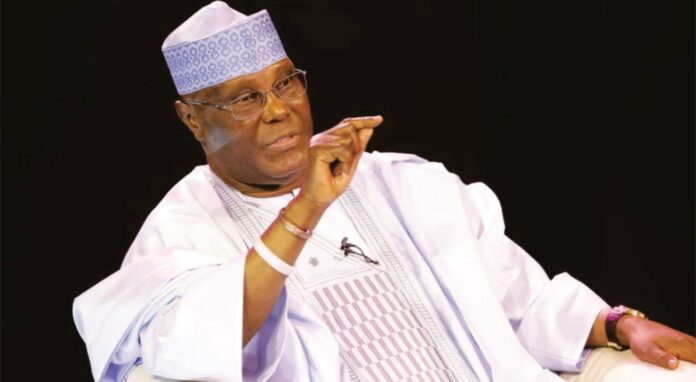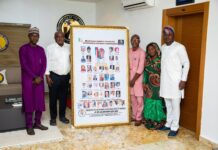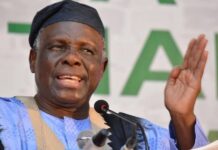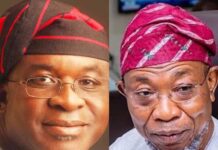Atiku: Nigeria on the brink of losing democracy
Former Vice President Atiku Abubakar has raised alarm over the future of Nigeria’s democracy, warning that the country could lose its hard-fought democratic system if current trends continue.
Speaking at a national conference in Abuja on Monday, Atiku emphasized that Nigeria is at a critical juncture in its democratic journey.
Atiku made his remarks as a panellist at the conference on strengthening democracy, which was organized by the African Centre for Leadership, Strategy and Development (Centre LSD), the Centre for Democracy and Development (CDD), the Westminster Foundation for Democracy (WFD), the Peering Advocacy and Advancement Centre in Africa (PAACA), and the National Peace Committee (NPC).
“We are really at a crossroads in this democratic experiment. We either decide we want to be democratic or we abandon it,” Atiku stated, highlighting concerns over the growing role of courts in deciding election outcomes rather than the will of the people. He criticized the shift in governance, where political parties have become subservient to government influence rather than dictating policy and governance.
Atiku also pointed to the challenges faced by political parties, asserting that they should be driving governance and serving the interests of ordinary people. He expressed skepticism about the current National Assembly’s willingness to adopt his previous recommendations for Electoral Act amendments, despite his best efforts in good faith. “With the current National Assembly, I don’t see them adopting most of the recommendations I made,” he remarked, describing the body as a “rubber stamp” for the government.
READ ALSO: “I did not agree to any power-sharing deal with Atiku, Peter Obi” – Kwankwaso
The former VP also pointed to Nigeria’s electoral body’s credibility, drawing a comparison to Turkey, where the electoral body refused to declare President Recep Erdogan the winner after he fell short by 0.5% of the votes. Atiku questioned whether Nigeria’s electoral system could inspire similar trust.
Atiku did not shy away from alleging that the current administration was trying to co-opt opposition party leaders through financial inducements. “I met with a political party leadership in the present opposition, and they told me flatly that this government gives them N50 million each,” he disclosed, warning that this could undermine democracy if not addressed.
He called on Nigerians to make a decision on whether they truly wanted to fight for democracy, pointing to his own personal struggles over the years, including an assassination attempt, exile, and the seizure of his businesses. “I am doing it because of you,” he said, emphasizing his long-standing commitment to the democratic cause.
In response to questions about the ruling parties’ “winning at all costs” mentality, Atiku acknowledged that the political system had been distorted. He echoed the concerns of former Kaduna State governor, Nasir El-Rufai, who also attended the event, about the need for opposition parties to unite to protect democracy.
El-Rufai stressed that the quality of governance in Nigeria and the increasing targeting of opposition parties should be viewed as a national emergency. He highlighted a recent poll showing that 75% of registered voters do not intend to vote in the 2027 elections, which he deemed a dangerous sign for the country’s democratic future. He urged opposition parties to form a broad coalition, similar to the APC’s formation in 2014, to safeguard democracy but warned that any new opposition group must ensure internal democracy from the outset.
The former Kaduna governor also expressed concerns about the state of the ruling party, APC, which he helped form. “I no longer recognize the APC,” El-Rufai remarked, citing the lack of party meetings and internal structures as a sign of disarray. He lamented that the original goals of the APC, such as fighting corruption, revamping the economy, and restoring security, had been abandoned.
El-Rufai further warned against illiterate or inadequately educated delegates electing leaders, stating that without setting minimum qualifications for both delegates and candidates, the country would continue to face poor leadership.
Former Rivers State governor, Rotimi Amaechi, also weighed in on the conversation, pointing out that Nigerians must be ready to defend their votes, as power would not be freely given. He recalled how the people of Kano mobilized to ensure the election of Malam Ibrahim Shekarau as governor, despite fierce opposition. Amaechi stressed the importance of citizens being willing to fight for democracy, citing how former President Goodluck Jonathan conceded defeat in 2015 after the opposition demonstrated their resolve.
Vice President Kashim Shettima, represented by his Special Adviser on political issues, Dr. Hakeem Baba-Ahmed, also addressed the conference, acknowledging the imperfections of democracy but emphasizing its superiority over other systems of government. Shettima reiterated the government’s commitment to strengthening democratic institutions, addressing the country’s challenges, and ensuring that Nigeria’s democracy continues to thrive despite current difficulties.
“We will work to fix major weaknesses in our economy, secure our communities, fight corruption, and strengthen the judiciary’s independence to improve governance,” Shettima said, calling on Nigerians to remain committed to sustaining democracy.
However, efforts to obtain responses from the presidency or the ruling APC on the statements made by Atiku and El-Rufai were unsuccessful at the time of writing.
Follow the Neptune Prime channel on WhatsApp:
Do you have breaking news, interview request, opinion, suggestion, or want your event covered? Email us at neptuneprime2233@gmail.com





